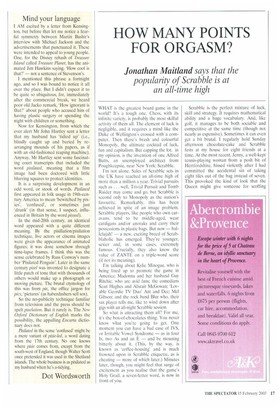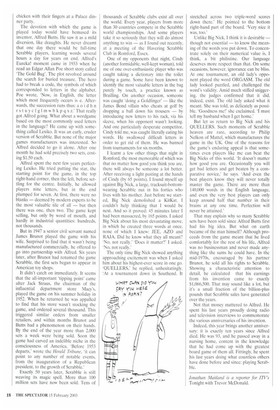HOW MANY POINTS FOR ORGASM?
Jonathan Maitland says that the
popularity of Scrabble is at an all-time high
WHAT is the greatest board game in the world? It's a tough one. Chess, with its infinite variety, is probably the most skilful activity of them all. The element of luck is negligible, and it requires a mind like the Duke of Wellington's crossed with a computer. Then there's brash and colourful Monopoly, the ultimate cocktail of luck, fun and capitalism. But capping the lot, in my opinion, is the invention of one Alfred Butts, an unemployed architect from Poughkeepsie, near New York: Scrabble.
I'm not alone. Sales of Scrabble sets in the UK have reached an all-time high of more than a million a year. Trivial pursuits such as . .. well, Trivial Pursuit and Tomb Raider may come and go, but Scrabble is second only to Monopoly as the nation's favourite. Remarkably, this has been achieved in spite of an image problem. Scrabble players, like people who own caravans, tend to be middle-aged, wear cardigans and/or anoraks and carry their possessions in plastic bags. But now — hallelujah! — a new, exciting breed of Scrabblaholic has emerged. They're younger, sexier and, in some cases, extremely famous. Crucially, they also know the value of ZANTE on a triple-word score (if not its meaning).
I'm talking about Kylie Minogue, who is being lined up to promote the game in America: Madonna and her husband Guy Ritchie, who are avid fans; the comedians Sean Hughes and Alistair McGowan; 'Lovable Geordie TV Duo' Ant and Dee; Mel Gibson; and the rock band Blur who, their sax player tells me, like to wind down after gigs with an all-night Scrabble session.
So what is attracting them all? For me, it's the box-of-chocolates thing. You never know what you're going to get. One moment you can have a had case of IVS, or Irritable Vowel Syndrome — as in four Is, two As and an E — and be moaning bitterly about it. (This, by the way, is known as 'coffee-housing' and is much frowned upon in Scrabble etiquette, as is cheating — more of which later.) Minutes later, though, you might feel that surge of excitement as you realise that the game's Holy Grail, a seven-letter word, is now in front of you. Scrabble is the perfect mixture of luck, skill and strategy. It requires mathematical ability and a huge vocabulary. And, like golf, it manages to be both sociable and competitive at the same time (though not nearly as expensive). Sometimes it can even get a bit brutal. I regularly hold Sunday afternoon chocolate-cake and Scrabble tests at my house for eight friends at a time. At the most recent, Jenny, a well-kept tennis-playing woman from a posh bit of Hertfordshire, hissed violently after I had committed the accidental sin of taking eight tiles out of the bag instead of seven. This provoked the kind of look that the Queen might give someone for scoffing chicken with their fingers at a Palace dinner party.
The devotion with which the game is played today would have bemused its inventor. Alfred Butts. He saw it as a mild diversion, like draughts. He never dreamt that one day there would be full-time Scrabble players, learning words several hours a day for years on end. Alfred's Eureka! moment came in 1933 when he read an Edgar Allan Poe short story called 'The Gold Bug'. The plot revolved around the search for buried treasure. The hero had to break a code, the symbols of which corresponded to letters in the alphabet. Poe wrote, `Now, in English, the letter which most frequently occurs is e. Afterwards, the succession runs thus: aoidhn rstuycfglmwbkpqxz.'Thatreally got Alfred going. What about a wordgame based on the most commonly used letters in the language? He came up with something called Lexiko. It was an early, cruder version of Scrabble. But none of the major games manufacturers was interested. So Alfred decided to go it alone. After one month he had sold precisely two sets, costing $1.50 each.
Alfred spent the next few years perfecting Lexiko. He tried putting the star, the starting point for the game, in the top right-hand corner, then the left, before settling for the centre. Initially, he allowed players nine letters, but in the end plumped for seven. At first, there were no blanks — deemed by modern experts to be the most valuable tile of all — but then there was one, then two. The game kept selling, but only by word of mouth, and hardly in industrial quantities: hundreds, not thousands.
But in 1947 a senior civil servant named James Brunot played the game with his wife. Surprised to find that it wasn't being manufactured commercially, he offered to go into partnership with Alfred. Six years later, after Brunot had renamed the game Scrabble, the first sets began to appear in American toy shops.
It didn't catch on immediately. It seems that the all-important 'tipping point' came after Jack Straus, the chairman of the influential department store Macy's, played the game on his summer holiday in 1952. When he returned he was appalled to find that his store wasn't stocking the game, and ordered several thousand. This triggered similar orders from smaller retailers, and within months Brunot and Butts had a phenomenon on their hands. By the end of the year more than 2,000 sets a week were being sold. Soon the game had carved an indelible niche in the consciousness of America. 'Before 1953 departs.' wrote the Herald Tribune, it can point to any number of notable events, from the inauguration of a Republican president, to the growth of Scrabble.'
Exactly 50 years later, Scrabble is still weaving its magic spell. More than 100 million sets have now been sold. Tens of thousands of Scrabble clubs exist all over the world. Every year, players from more than 30 countries compete in the Scrabble world championships. And some players take it so seriously that they will do almost anything to win — as I found out recently, at a meeting of the Havering Scrabble Club in Romford, Essex.
One of my opponents that night, Cindy (another formidable, well-kept woman), told me of one over-enthusiastic player who was caught taking a dictionary into the toilet during a game. Some have been known to identify the most valuable letters in the bag purely by touch, a practice known as Brailling. On another occasion, someone was caught 'doing a Goldfinger' — like the James Bond villain who cheats at golf by dropping a ball down his trousers — by introducing new letters to his rack, via his sleeve, when his opponent wasn't looking. And one particularly desperate competitor, Cindy told me, was caught literally eating his words. He swallowed difficult letters in order to get rid of them. He was banned from tournaments for six months.
I learnt a few other things that night in Romford, the most memorable of which was that no matter how good you think you are, there will always be someone a lot better. After receiving a light pasting at the hands of Cindy (by 65 points). I found myself up against Big Nick, a large, tracksuit-bottomwearing Scrabble nut in his forties who lives with his mother. Just before we started, Big Nick demolished a KitKat. I couldn't help thinking that I would be next. And so it proved: 45 minutes later I had been massacred, by 165 points. I asked Big Nick about his most devastating move, in which he created three words at once, none of which I knew: JEE, AZO and RAJA. Did he know what they all meant? 'No, not really.' Does it matter?' I asked. 'No, not really.'
The only time Big Nick showed anything approaching excitement was when I asked him about his highest-ever score in one go. 'QUELLERS,' he replied, unhesitatingly. At a tournament down in Southend. It stretched across two triple-word scores down there.' He pointed to the bottom right-hand part of the board. 'Very nice it was, too.'
Unlike Big Nick, I think it is desirable — though not essential — to know the meaning of the words you put down. To concentrate solely on their numerical value is, I think, a bit philistine. Our language deserves more respect than that. On some occasions, however, ignorance can be bliss. At one tournament, an old lady's opponent played the word ORGASM. The old lady looked puzzled, and challenged the word's validity. Amid much stifled sniggering, the judges confirmed that it did, indeed, exist. The old lady asked what it meant. She was told, as delicately as possible. 'Goodness me!' she exclaimed. 'I must tell my husband when I get home.'
But let us return to Big Nick and his QUELLERS. Such moments of Scrabble heaven are rare, according to Philip Nelkon of Mattel, which manufactures the game in the UK. One of the reasons for the game's enduring appeal is that sometimes even players like me can beat the Big Nicks of this world. 'It doesn't matter how good you are. Occasionally you will get bad letters and get beaten by a comparative novice,' he says. 'And even the best players know they will never totally master the game. There are more than 140,000 words in the English language, and even the very best players can only keep around half that number in their brains at any one time. Perfection will never be attained.'
That may explain why so many Scrabble sets have been sold since Alfred Butts first had his big idea. But what on earth became of the man himself? Although proceeds from the game meant that he lived comfortably for the rest of his life, Alfred was no businessman and never made anything like the sums he could have. In the mid-1970s, encouraged by his partner Brunot, he sold all his rights to Scrabble. Showing a characteristic attention to detail, he calculated that his earnings from his invention came to exactly $1,066,500. That may sound like a lot, but it's a small fraction of the billion-plus pounds that Scrabble sales have generated over the years.
Not that money mattered to Alfred. He spent his last years proudly doing radio and television interviews to commemorate the various anniversaries of his invention.
Indeed, this year brings another anniversary: it is exactly ten years since Alfred died. He was 93, and he passed away in a nursing home, content in the knowledge that he had come up with the greatest board game of them all. Fittingly, he spent his last years doing what countless others have done before and since: playing Scrabble.
Jonathan Maitland is a reporter for ITV's Tonight with Trevor McDonald.



































































 Previous page
Previous page